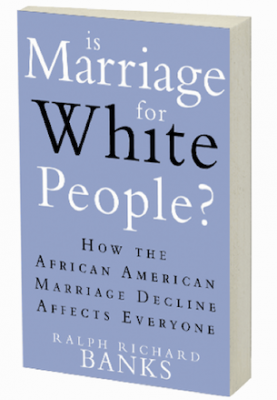Critical Review of “Is Marriage for White People” by Ralph Richard Banks
Re-examine everything. Go back to where you started, or as far back as you can, examine all of it, travel your road again and tell the truth about it. Sing or shout or testify or keep it to yourself: but know whence you came. ~James Baldwin (The Price of the Ticket)
This is the quote on the opening page of the new book by Stanford Law Professor, Ralph Richard Banks, entitled Is Marriage for White People? How the African American Marriage Decline Affects Everyone. And after having read this book from cover to cover in a matter of hours, the quote the author chose applies aptly to the message with in its pages.
The point he is trying to convey…the information he is trying to provide, has reached my ears and my heart. I desperately hope it will reach the ears and hearts of black women everywhere. His message is one we cannot afford to dismiss or ignore, and most ironically, it is a black male, telling us what we should already know. Not a comedian, not an actor, not some armchair revolutionary or outsider, who, once again, is studying us like zoo animals or an expedition on National Geographic. No, this time, it is an Ivy League trained, Professor of Family Law. It is a black person. And it is a male. Black women had better listen up, or continue to suffer the dire consequences of our unwillingness to face the truth that’s set before us.
Here’s my personal experience with this book, and what I learned from what lies within its pages…
I had been hearing rumors of an upcoming book about blacks and marriage for some weeks now…whispers of it mentioned in online discussions…advanced criticism of the value of yet another critique of black folks lives, disputing of the very premise of it, before it was even on the market…references to its upcoming release and the potential affects of the information that laid within its pages. And being one who has always looked at marriage with a VERY suspicious eye, I almost thought to myself, “oh, here we go again. Not ANOTHER person singing the praises of that good ol’ institution of marriage, and telling black folks, (particularly black women) that the demise of the black race is all because WE keep giving up the ‘goods’ outside of wedlock”. Like many others, I was quick to judge the author and his book, even before I had read it. And with good reason.
Over the past two years, there has been a barrage of books, articles, blogs, studies, TV specials and social commentary, by both ‘experts’ and by everyday folks, alike, trying to figure out what’s wrong with US and why we cant seem to get our shit together. (The ‘us’ usually referring to black women and the ‘shit together’ usually referring to finding and sustaining long term relationships, ultimately resulting in marriage and ‘legitimate’ children). So I assumed that this was just one more fool, capitalizing off the anti-black woman phenomenon that has become so prevalent in the media these days. I almost wrote him off.
After Deborrah Cooper mentioned the book positively in a comment on a mutual friend’s FaceBook page, and another friend posted a link to comments made about the book, I decided to pick the book up the next day. I ran down to Barnes & Noble, found me a copy, and began reading it on the spot. While sitting on the floor of B&N, I found, just a few pages in, that the book did not seem to be at all what I’d assumed.
I was drawn to the information like a moth to a flame and I couldn’t put it down. I was impressed by the authors writing style – a clear, concise, easy language that lacked the scholarly pretense of similar bodies of work. He doesn’t waste a lot of time with fluff. He gets right to business, but I didn’t feel like I was joining an already ongoing conversation. He gives just enough background info to orient you as to what he’s about to discuss, and then dives into the meat of the subject, within the first few pages.
The author starts off, describing the overall trends towards marriage decline, in America and across the world. He explains how not just blacks, but people of all the major industrial nations, are seeing a marked decline in marriage, changing attitudes towards marriage, and redefining of the purpose and role of marriage for their societies. He gives a brief timeline on the history of marriage, then and now, and an explanation of some of the external forces that compelled major changes in the institution, the rules and the roles attached to it. He explains how economics, moving from the industrial age, to the technological age, exporting of jobs, the women’s rights movement, birth control, education and different attitudes towards life in general, have affected what was once a very structured and regulated institution.
You don’t feel as if you are being lectured or talked down to. He is simply telling you like it is…or at this point in the book, like it was. I was sucked in, but my booty started to hurt, sitting on the floor of that bookstore, so I decided to bring it on home so I could keep reading.
I continued to read on the bus, walking from the bus stop, and after I finally got to my apartment. I was so enthralled with it, that I could barely make myself something to eat, and ended spilling some sauce from my meal, onto the cover. (Thank goodness I took off the jacket, while I was reading it). One of the things that kept me so interested is that he writes, primarily from and for the perspective of black women, and in particular, middle to upper middle class black women.
With a candor and honesty rarely expressed by males, relating a female experience, he explains how there has been much interest and many studies done on the effects of interpersonal relationships, including marriage (and the lack there of) on the lives of black people (and particularly, black women) in the lower socio-economic bracket. But very little work has been done to study the effects of the ‘marriage crisis’ on middle, to upper middle class, black women.
So, part of what I kept me turning the pages, was that I felt that his words were speaking directly to the experiences of me and women like me…most of the women in my family and in my close and extended circle of friends. Having done over 100 personal interviews of both black women and black men, he includes many personal stories and recollections from black women, some of which I realized were the exact experiences of women I know who were dealing with those circumstances, right now.
(continued on page 2 below)
Category: Book Reviews, Society and Culture














I left out something in my comments that I didn’t include because it was initially written directly to a friend but since it is posted for the world to see, I need to add it. And that addition would be that in no way am I making excuses for Black men– we are most definitely in the wrong about a lot of things…A LOT OF THINGS. And I take the responsibility for the collective whole of us as males/men (two totally different things). However, in the same breath, ALL of us are not at fault while far too many are. Realistically, ALL Black women aren’t “good” women, or women that have prepared themselves to be a positive partner with a man [and vice versa]. Please, please, please do not misconstrue this for an attack…there is no need to attack that which I love. I just think that we ALL have to take off the veils and be brutally honest about it on both sides…and I will definitely say that our women are at a disadvantage when it comes to the availability of a “good” man– as mentioned before, it has been designed that way. Hopefully I didn’t make bad matters worse but I’m not one to sugar-coat things– there is liberation in the truth even though the truth can hurt~if you resist it.
[exhaling in disgust and overstanding]…Hey ——-, I just read that article and I feel the pain of the women who identify with it which I’m willing to bet is a vast majority. My mind, right now, is all over the Universe because of the possibilities and probabilities that we face as the earth gets ready to enter into the next phase, a phase that I’m almost convinced will make all the material in articles like these a moot point. But until then, it has to be addressed in a last ditch effort to repair the schism that has existed between the Black woman and man for far too long. And privately, I realize that some things can be flawed to a point of no repair.
Sh*t…do I want to comment on the article, the collective dilemma of Black women, the collective dilemma of the “good” Black men left or You and your own personal experience of the same dilemma…and in posing that question to myself, simultaneously almost, I answered it. It is all inter-related/inter-dependent like the relationship between man and woman – regardless of color – was designed to be.
First, what is the problem? If we can step back and take a long hard look at where it began, maybe, as with a lot of our community’s ills, we are admonished to go back to the days of chattel slavery. At the moment, since I’m writing this primarily to you, ——-, there’s no need to rehash all of the specifics on how we were taken from a particular ‘space & being’ and stripped of everything that entailed it until even the memory was deleted on a conscious (and in some respects subconscious) level. Then, in being transplanted against our will and nature, we were programmed to take on for ourselves an alien ‘space & (non)being’. Now, to try and abbreviate this as best I can without diluting the important factors that tie it all together, we have to consider, at the very least, that just as life forms can evolve they can also devolve, both on an individual level or in a collective sense. Unfortunately, when I look at this dilemma from a macro-cosmic view, facts show that, on one hand, Black people born and raised (for lack of a better term) in the so-called United States (factoring in the first day of the Afrikan slave trade up to now) have evolved on the external level meaning that we can accomplish all the things in this Western societal construct which requires that we catch up-keep up-and surpass any other group of people in any arena on any level. I see that as being ‘external’, or as Tolle like’s to phrase it, the world of “form”. Sticking with the reality of slavery and it’s underlying and ongoing effects, I believe it safe to say that the Black woman has caught up-kept up and surpassed the Black man in the ‘external’ aspect. Most importantly, it seems to me, as an ultra observer of past events that make-up what is labeled “history”, this has been a part of strategy. It is no secret that the white European male has stolen and claimed ownership of industry in the world; hell, let’s be completely real, they have stolen and claimed ownership of nearly every tangible thing in the world that has been identified as of yet. As such, and in having an understanding of the European ethos which is based in “individualism” (and warrants the attainment of power), we surely know that it was necessary to strategize along all lines of maintaining this ownership, this power. In so doing, it doesn’t take a rocket scientist, as they say, to discern that the unity of the Black man and woman, i.e., the Black family, was a major threat to their existence as they saw it and needed it to remain in place. While the Black man is responsible to account for and admit to the many shortcomings that have reaped havoc on the Black family and community, I think the more mature stance to take – at least initially, whenever we agree on a concrete, committed starting point – would be to ask a simple question, and in my opinion, that would be “Why?”. When you have been taken away from your natural mind and forced to exist in an alien environment with alien food and alien rules and alien forms who surround and ultimately control you – you have been put in a position that dictates some sort of compromise at every turn. And ‘the compromise’ is what brings us to our devolution on an interior level.
When I use the terms interior and exterior, these are the closest labels that I could pull from my own mind to paint the most visible understanding of what it is I mean. So equate exterior with material, tangible things. When I speak of ‘interior’, think of those elements that are untouchable, ultimately responsible for the true success or failure of the exterior…and I do realize that these are relative terms I’m using but they serve a purpose. Those things interior were the elements directly responsible for our survival during the chattel slavery experience. The interior orchestrated rebellions and underground railroads and the language of the drum. But as the chattel slavery experience endured and strengthened and even became more palatable to the ones who benefited down to the ones who resigned to the favor of a mere existence on this earth…which meant more and more attention was given to the exterior (survival) while less and less attention was given to the interior (essence).
You see, as the exterior was gradually raised to a pedestal, the interior was averted. We like to look back in a grand nostalgic sense at our grandmothers and grandfathers and the great ones before them and the great-great ones before that along with the aunts and uncles and great ones of them that we thought served as the shining example of family…and on the surface, they did. They kept it together and portrayed a portrait of family in the finest sense that we could imagine. They were honorable people and still, with valiant attempts, clutched the last vestiges of the interior. But we, the children looking up, were unaware of the insatiable pain they experienced…for with all their might and resolve and resourcefulness, they were still forced to endure within that which had been tattered and broken. And this was a both-sides experience, meaning that the men and the women were forced to somehow process this exiled-state-of-mind as part of everyday life not ever quite being able to touch its roots…so, eventually, what do you do? Eventually, we were going to have to face our forced assimilation into those things that were man-made and deemed natural when to us, naturally, they were all just the opposite. Eventually, that one little piece of string was bound to unravel tempting the inevitable break-down to occur. Eventually, that which – from the very beginning – is dysfunctional fails to function at levels that can only continue to be degraded. And now, eventually has arrived.
So we now wonder where we are in this game of love or lack thereof…confused to how we got here…angry at ‘what-the-hell-happened?’…looking for our lost fathers and uncles and brothers…no longer recognizing our sisters and our aunts and mothers…left in an organized wilderness wondering what is wrong with me…what is wrong with us?
There is a term we can say is cliche but rings true when you/we see it, or better yet, know it for what it is: That term is “back to basics”. Unfortunately, the exterior set [us] sail on what we thought was a voyage, a grand adventure, an ocean liner cruise…then ran out of fuel in the middle of an unknown sea where we sink slowly, only faster now, with it. One of the key words is “back”. While I know it’s painful and most of us have not wanted to identify with the whole ordeal, going back to the chattel slavery experience is key. It no longer and never has served us to resist this. Acceptance of ‘what it all was’ which has resulted in ‘what it all is’, is our saving grace. Frankly, I never intended to write as much as I have – seriously – and that precludes me from delving into much more but it’s necessary that I crack the door that behind it holds treasures of our people’s past existence…our mass contributions to this civilization…our royalty…our Oneness. If you can become aware – and of course, I’m not speaking to you, I know you know (——) – of but a fraction of these treasures that have been untold and purposely hidden and even destroyed, then you will be able without reservation to accept the brief period in our collective existence wherein we fell. But as we fall, as long as blood continues to run blue through our veins, we can get up.
But…there is such a thing as “too late”.
Having said all of that, I can still hear a background voice whisper, “Ok, I get what you’re saying but I still want a [good] man” Being single myself I say the exact same thing, replacing the man with a woman. There’s more I want to say about this ——–, I’m especially taken aback by the final option of “dating out”. And let me just touch on that real quick before I go and come back later…
While I’ve commented on some of the issues that directly affect and relate to the lack of Black men and women relationships, another reality that we also need to address is that this ‘dilemma’ is not only one that ails Black folk…naw, this is a human dilemma. Grass being greener in the neighbor’s yard only looks like that from afar until you actually go over there and see for yourself, and lo and behold, there’s a brown spot over here…it’s some weeds back in the corner over there…I never noticed this spot, it hasn’t even grown in yet. Yes, this is but an analogy, however, a very real analogy. I’m short-changing the discussion because I really need to go (and go deeper), although I would like to stay here all day and talk about this because it is definitely of dire importance – maybe this is the spark I needed to finally start my blog radio talk show~we as men and women NEED to talk – but basically, men and women alike have to get “back to basics” (key word this go ’round being “basics”) and start to learn about each other…learn about the differences that make us who and what we are…and most importantly, as we learn these things we should uphold what we learn, if it’s truth, by respecting our differences. It’s so much more I’d like to say, maybe I can get into again, later~I’d like to. Thanks for sharing the article, ——-…seems like it couldn’t have come in a better space. Ttyl…
I appreciate your detailed review:) When I first saw this book on CNN, I thought it would be just another empty critisism of black people. It looks as though it maybe worth the read.
I just may read this book after your review. I don’t know what’s happening, and I never understood why so many black women are resistant towards dating out, even with these glaring statistics. I get that some black women aren’t attracted to men of other races…BUT with the way things are, we can’t afford to sit around expecting the “black knight in shining armor” to show up.
I just don’t understand why some black women are choosing race over love, respect, dignity, intimacy, etc and all that other good stuff that comes with being in a relationship.
I read the book. It struck a chord with me also. I even checked out his sources to see if they could be verified. I had no problem finding them. As of now, I’m only interested in dating a man with the same values as me. I will always be a black woman, but I choose to define what kind of relationship I want and who I get involved with. To me, race takes a back seat to finding that special someone.
I am ready, too! Thank you for such a great review. I am going to pick this book up today and will probably spend the weekend reading it.
Girl, sista girl, I’m “which you”–I’ve been waiting for more black women to get on board. Time to reclaim our power and take CARE of ourselves for real, the rest will come, be that as it may. But we do NOT have to accept foolishness, unless we wish to wallow in it, and I, for one, do not.
I am so happy that you saw yourself in this book. However, if sisters would take the blinders off, many will see themselves without having to go out and buy this book (not that I’m discouraging that…lol). Truth be told, I don’t think (SOME!) black men have been trying to hide what they are all about. Most sisters know deep down inside what time is it and has been. In fact, if they didn’t they wouldn’t accept such foolishness as man sharing. I think the ultimate answer to this dilemma is for sisters to start respecting themselves. It sounds trite, but it’s true. If we respect ourselves and know our worth, we would not accept this mess that some black men have laid down for us.
We would realize how wonderful we are and how lucky any man would be to have us. We would have to believe that before they would. If women would realize that we do not need a man, I think the desperation levels would subside. I think we would get things into perspective and realize that we can have a rich, full life without a guy….once we figured that out, we wouldn’t be so desperate to hook our claws into one. We would understand that a relationship is an important part of our lives…..not our entire life.
We wouldn’t give another person the upper hand simply because we want them to put a ring on it. What would you gain if the guy didn’t honor the vows behind that ring? We’ve given men so much rope that they think they can do whatever they want to us…..and they do! If we would stop giving away the milk for free…..do not have sex with every man that says hello, then our stock would rise. No one values anything that they can get easily on every street corner. Give yourself the gift of self-respect whether there is a man there or not.
Lastly, stop thinking that just because God made you black that it means you can only date black men. Sweet jesus….what a waste if you think you can’t find love with other men who through no fault of their own happened to be born another color. Stop looking at color and look at the man. Does he treat you with respect, dignity and honor? Then that should be the only qualifications that you should be concerned about. Open your eyes and your world will open just as wide. Do not continue to give men who do not respect and treasure you your time or attention. YOU deserve better, so start acting like it!!
I definitely want to read this book. Great review, by the way! You’ve gotten me all excited about a work of non-fiction. That’s quite an accomplishment.